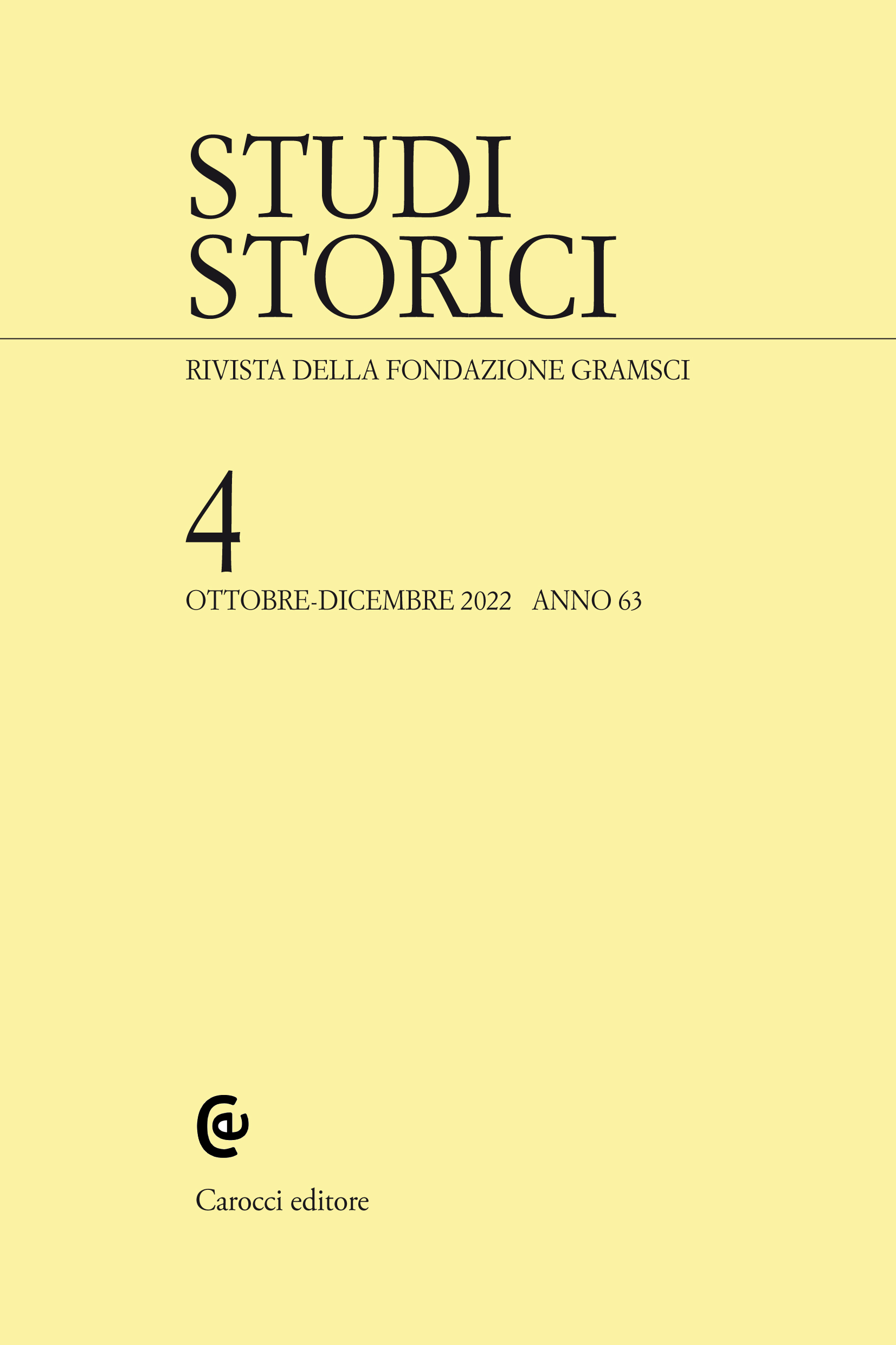
ottobre - dicembre 2022 anno 63
Sommario e abstract degli articoli
Prima del fascismo. Ripensando la crisi del dopoguerra in Italia
Politiche della sanità: pratiche, agenti, norme in area mediterranea (secoli XVI-XIX)
Tommaso Baris, pp. 769-790
I governi liberali nell’Italia del primo dopoguerra. Un riesame critico
The Liberal Governments in Post-WWI Italy. A Critical Balance
In the aftermath of WWI the ruling liberal class faced the task of democratizing the Italian political system. Peasants and workers had, in different ways, taken part in the conflict, paying a very heavy price – and they now called for major political and social reforms. The response of the liberal political world – fractured as it was by group and personal enmities – proved weak and the policies adopted (from the introduction of a proportional electoral law to the timidly attempted industrial and agricultural reforms) did not bridge the gap with a popular reality radicalized by the revolutionary suggestions coming from Soviet Russia. In such a context, the ruling elites did not envisage a threat in the rise of Fascism, seen as an understandable – if at times excessive – reaction against those who “denigrated” the war effort and advocated radical social transformations.
Keywords: Post-WWI, Fascism, Liberalism, Reforms.
Parole chiave: Primo dopoguerra, Fascismo, Liberalismo, Riforme.
Laura Cerasi, pp. 791-827
Il realismo impossibile. Appunti su liberali e crisi dello Stato
Impossible Realism. Notes on Italian Liberals and the Crisis of the State
During the post-war turmoil, what hindered part of the Italian liberal political class in reading the novelty represented in the political system by the emergence of fascist violence? What prevented them from grasping the extent to which the advance of fascism drove a decisive wedge into the crisis of the liberal state? This essay presents an itinerary of reading through the parliamentary questions on domestic politics, interwoven with points of juridical and political reflection on the crisis of the State, in order to reconstruct the attitude with which the liberal political class tackled the issues posed by social conflict and political violence – thus revealing a conception of the State and of government that made the rise of fascism possible.
Keywords: Liberal state, Parliament, Crisis, Fascism, Political violence.
Parole chiave: Stato liberale, Parlamento, Crisi, Fascismo, Violenza politica.
Giacomo Gabbuti, Bruno Settis, pp. 829-864
Difendere la produzione, difendersi dalla redistribuzione
Defending Production, Beating back Redistribution
This article returns to the classic problems of the industrialists’ and the middle classes’ growing distrust for liberal governments, and eventual support for Fascism, by placing them both in the context of the European post-war crisis and emphasizing their resistance towards labour unrest and progressive social and fiscal reforms. Focusing on different organised representations of economic interests, the article analyses the political struggles concerning industrial production and distribution/redistribution (notably, taxes). It concludes that the former was the field in which industrialists developed their ambition of exercising full control over the government, while the latter provided the ground for a convergence of the higher and middle classes against liberalism and labour.
Keywords: Fascism, Red biennium, Post-war crisis, Balanced budget, Fiscal reforms.
Parole chiave: Fascismo, Biennio rosso, Crisi del dopoguerra, Pareggio di bilancio, Riforme fiscali.
Andrea Ventura, pp. 865-897
Le proteste nelle campagne e la crisi dello Stato liberale (1919-1920)
Protests in the Countryside and the Crisis of the Liberal State (1919-1920)
Agrarian struggles are pivotal in understanding the crisis of the liberal state in Italy after WWI. Historiography has focused on the revolutionary inadequacy of these movements, the lack of organisation capable of nationalising such a struggle, and the responsibilities of the parties of the Left, as well as trade unions, for the rise of fascism. Excessive focus on these topics has overshadowed richness and heterogeneity, while impairing the circulation of concrete proposals arising from so massive an agrarian mobilisation. The aim of this essay is to overcome these limitations by asking precise questions: what features, conceptual horizons, and objectives did the agrarian struggle have, and what results did it achieve during the two-year period from 1919 to 1920? What kind of violence did they express? How were they perceived by the police, the agrarians, and the liberal ruling class? These questions may be answered starting from the reconstruction of the emblematic case of the Tuscan peasant revolts.
Keywords: Post-WWI, Social conflict, Agrarian struggles, Fascism, Italy, Tuscany.
Parole chiave: Primo dopoguerra, Conflitto sociale, Proteste agrarie, Fascismo, Italia, Toscana.
Leonardo Pompeo D’Alessandro, pp. 899-929
«Democratizzare il regime della fabbrica». Il problema del «controllo operaio» e il fallimento del compromesso giolittiano
“Democratizing the Factory Regime.” The Problem of “Worker Control,” Giolitti, and the Crisis of the Liberal State
This paper aims to retrace the topic of industrial democracy in the immediate first postwar period. The focus is on the State’s action and its attempts to find a solution to an instance of participation in political and economic life coming from new social parties. In this regard, the paper investigates the action of Giolitti’s government and his proposal on “Control over industries by workers.” This proposal represented a significant attempt to provide an answer to the institutional crisis of the postwar period through the search for corporatist compromises, mediated by the State, between the organized interests of industrialists and those of trade unions. It expressed the awareness that it was no longer possible to rebuild upon old foundations the equilibria between rulers and the ruled that had been torn after the outbreak of war.
Keywords: Post-WWI, Industrial democracy, Giovanni Giolitti, Crisis of the liberal State, Corporatist compromises.
Parole chiave: Primo dopoguerra, Democrazia industriale, Giovanni Giolitti, Crisi dello Stato liberale, Compromessi corporatisti.
Marco Bresciani, pp. 931-960
Una rivoluzione «antiasburgica». Caos postbellico, violenza e ascesa fascista nell’Istria post-asburgica (1918-1923)
An “Anti-Habsburg” Revolution. Post-war Chaos, Violence and the Rise of Fascism in Post- Habsburg Istria (1918-1923)
This essay attempts to examine established visions of post-war in Istria, through the methodological perspectives of recent (post-) Habsburg historiography, starting from the category of “national indifference.” Instead of focusing on the clash between “Italians” and “Slavs,” it focuses on the chaotic dynamics of the post-1918 transition and the resulting violent conflicts in a rural context that was anything but nationalized. By appropriating Italian-speaking nationalism and reconfiguring the persistent Habsburg heritage, the new fascist movement managed to mobilize peasant masses on political-ideological grounds that contributed to radicalizing local rifts and conflicts. Aimed against “internal enemies” identified as “Austrians,” “Bolsheviks” and “Slavs,” Istrian fascism worked to establish total loyalty to the new state order.
Keywords: Postwar period, Post-Habsburg Istria, Nationalism, Fascism.
Parole chiave: Postwar period, Post-Habsburg Istria, Nationalism, Fascism.
Ricerche
Alberto Cotza, pp. 961-987
Il ripatico nel XII secolo. Tributi e comunità (Pisa, 1080-1180 ca.)
The ripaticum in the 12th Century. Tributes and Community (Pisa, 1080-1180)
How and why, in the twelfth century, did the city communities and rural lordships of the Regnum Italiae levy the ripatico, a public tax on ports? According to a traditional reading, it was the replacement of the kingdom by new local subjects after the crisis of the late eleventh century. Based on the analysis of the Pisan case and starting from historiographic reflection on the political integration between local elites and public powers, this essay sheds new light on the negotiating logic underlying the possibility of new subjects exercising public rights. This explanation reshapes the idea that there was an evolutionary line in the relationship between local communities and public powers and, in an organic vision, integrates persisting elements and moments of acceleration.
Keywords: Ripaticum, Twelfth century, Pisa, Tributes, Negotiation..
Parole chiave: Ripatico, XII secolo, Pisa, Tributi, Negoziazione..
Opinioni e Dibattiti
Alessandro Tuccillo, pp. 989-1019
5 maggio 2021. Intorno al bicentenario della morte di Napoleone
May 5, 2021. On the Bicentennial of Napoleon’s Death
The year 2021 marked the bicentennial of Napoleon’s death. This paper presents a reflection on the books published on the event within Italian historiography as well as a number of scholarly initiatives. The analysis aims to advance this discussion both by examining the continuities and discontinuities in historiographical trends and by outlining the cultural and political context of the commemoration of the Napoleonic Age. To grasp the particular features of the Italian context, the paper also considers the French historiographical and political debates, which have engendered many tensions and involved institutions at the highest levels. The bicentennial of Napoleon’s death offered a valuable opportunity to critically discuss Napoleonic historiography and the contribution of historians to the public debate over the legacies of the past.
Keywords: Napoleon, Napoleon’s Death Bicentennial, Napoleonic historiography, Historiography and public debate.
Parole chiave: Napoleone, Bicentenario della morte di Napoleone, Storiografia napoleonica, Storiografia e dibattito pubblico.
Sfoglia gli altri numeri dell’anno 63 / 2022
Elenco dei fascicoli pubblicati dal 2010
Seleziona fascicolo...
- anno 65 / 2024
- 1
- 2
- anno 64 / 2023
- 1
- 2
- 3
- 4
- anno 63 / 2022
- 1
- 2
- 3
- 4
- anno 62 / 2021
- 1
- 2
- 3
- 4
- anno 61 / 2020
- 1
- 2
- 3
- 4
- anno 60 / 2019
- 1
- 2
- 3
- 4
- anno 59 / 2018
- 1
- 2
- 3
- 4
- anno 58 / 2017
- 1
- 2
- 3
- 4
- anno 57 / 2016
- 1
- 2
- 3
- 4
- anno 56 / 2015
- 1
- 2
- 3
- 4
- anno 55 / 2014
- 1
- 2
- 3
- 4
- anno 54 / 2013
- 1
- 2
- 3
- 4
- anno 53 / 2012
- 1
- 2
- 3
- 4
- anno 52 / 2011
- 1
- 2
- 3
- 4
- anno 51 / 2010
- 1
- 2
- 3
- 4
